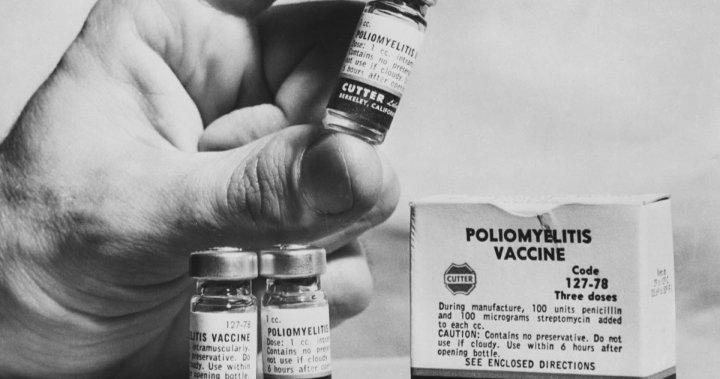Sunday marked World Polio Day amid the COVID-19 pandemic, and physicians are reminding us of the parallels between the highly infectious and crippling disease that spread in the first half of the 20th century and the highly contagious coronavirus.
“Both of these diseases are caused by viruses, and both of these diseases are now vaccine preventable,” said Doctors of BC president Dr. Matthew Chow.

As the number of eligible British Columbians with second doses of the COVID-19 vaccine slowly climbs to 84 per cent, some are still reluctant to get the shot.
Infectious disease expert Dr. Brian Conway said a similar hesitancy existed when the polio vaccine was first introduced in the 1950s.
“Today we don’t even question that it’s part of the vaccines that are given shortly after birth,” the medical director of the Vancouver Infectious Diseases Centre said.
“We’re not there with COVID yet.”

Like COVID-19, polio was spread through the air by people without symptoms talking, coughing or sneezing.
The viral disease hit children under the age of five the hardest, invading the nervous system, causing paralysis and breathing problems.
Many victims needed the help of an iron lung to keep breathing, while others had to use crutches or metal braces after suffering permanent nerve damage.
When Dr. Jonas Salk developed a polio vaccine in 1955, Conway said there was fierce resistance at first.
“When new products including the poliomyelitis vaccine in the 1950s are rolled out, there is a proportion of the population that will be skeptical,” he said.
Read more:
A polio disaster helped shape vaccine safety. Here’s why that matters for the coronavirus
At the time, the public had reason to question its efficacy. While the polio vaccine was safe, California-based Cutter Laboratories failed to manufacture it properly — with deadly consequences.
In April 1955, some batches of vaccine given to the public contained live polio virus, even though the CDC said they had passed required safety testing.
Thousands of children were infected with polio, 200 were left paralyzed and 10 died.
The CDC said the Cutter incident was a “defining moment in the history of vaccine manufacturing and government oversight,” and led to the creation of a better system for regulating vaccines.
“To explain to people that this was bad batch of vaccine, that on odds polio vaccination was much more effective than it was dangerous, slowly but surely convinced everyone to receive the vaccines,” Conway told Global News.

Today, polio is an excellent example of how vaccines are the key to control and eventually eliminate various diseases, Conway said.
Canada was certified as a polio free country in 1994, along with the rest of the Americas.
“I’ve never seen a case of polio and I hope I never have to see one,” UBC Department of Family Medicine clinical assistant professor Dr. Birinder Narang told Global News.
According to the BCCDC, the only polio cases in our province within the last thirty years were non-vaccinated residents who had contact with polio-infected foreign visitors.
“The success of the vaccines of the polio virus have actually led to the eradication of two of the three strains that were predominant in the world,” Narang said.
According to the World Health Organization, wild poliovirus type 2 was eradicated in 1999 and no wild poliovirus type 3 has been found since the last reported case in Nigeria in November 2012.
Read more:
Africa to be declared free of wild polio
As at 2020, wild poliovirus type 1 affects Pakistan and Afghanistan.
Chow described the virtual eradication of polio through vaccination as one of the greatest triumphs of modern medicine and public health.
“Many people who decline to be vaccinated against COVID-19 are actually enjoying the benefits of vaccination themselves right now,” he added.
That’s because they’ve been previously vaccinated as children, he said, and because they benefit from the billions of people around the globe who are inoculated against different diseases – including polio.
View link »
© 2021 Global News, a division of Corus Entertainment Inc.














































